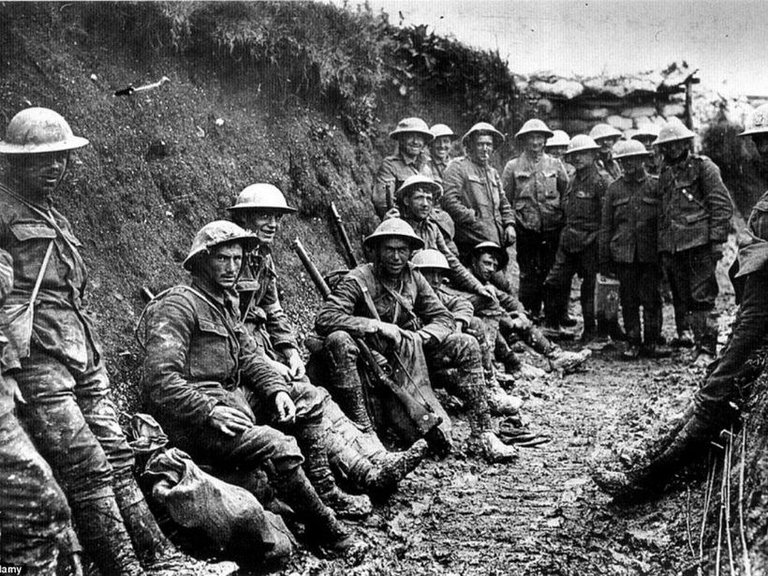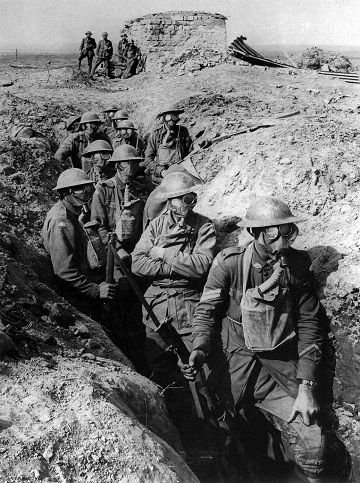Virginia Woolf, a twentieth-century writer, offers a portrait of life in England after World War I and how society, and especially soldiers, continues to be affected by the war in the years of peace through her novel Mrs. Dalloway. Septimus Warren Smith, a young shell-shocked war veteran, has escaped the hell of the trenches but continues to live in them in his head as he fights against his nightmares that are steadily becoming his reality. Septimus’s relationship with society in general becomes estranged as most people are unempathetic and sometimes even antagonistic to his condition. Even in June 1923, the war continues to affect Septimus’ daily reality and relationships as he yearns for a healing from the past that can only come through connection with empathetic people.

Although the war has been over for five years, Septimus Smith’s daily reality is complicated as he continues to experience trauma as he relives his years in the trenches. As a young man in his twenties, Septimus “was one of the first to volunteer” to join the war (86). He was a young, naïve, romantic who “went to France to save an England which consisted almost entirely of Shakespeare’s plays and Miss Isabel Pole in a green dress walking in a square” (86). In the trenches he “developed manliness; he was promoted; he drew attention” and leaves the army with distinction (86). He marries a young Italian woman named Rezia, and returns to England with honour. However, Septimus’s past is much more troubled and complicated than the phrase he “developed manliness” suggests. Like all war veterans, Septimus saw men killed and one particular death, that of his friend and officer Evans, troubles him greatly after the war ends.
Septimus’s “manliness” is exhibited by his detachment from his emotions as he becomes a hardened soldier who does not allow death to distract him from his job. Septimus and Evans develop a close friendship during the war but when Evans is killed in action, “Septimus, far from showing any emotion or recognising that here was the end of a friendship, congratulated himself upon feeling very little and very reasonably. The War had taught him. It was sublime. He had gone through the whole show, friendship, European War, death, had won promotion, was still under thirty and was bound to survive” (86). He watched shells “explode with indifference” (86). Yet, this sublimity during the war turns into a nightmare in the five years of peace after the war ends. Septimus’s lack of feeling at Evan’s death now permeates every relationship he has as he becomes numb to his surroundings and his own emotions. When he gets engaged to Rezia, “the panic was on him” because “he could not feel” (86). Although Septimus survives the war physically unscarred, his mental injuries remain years after the war officially ends in November 1918. By June 1923, the hopeful, youthful soldier has been transformed into a hallucinating, traumatized young man who believes he has committed a crime.

Septimus, like thousands of other war veterans, suffers from shell shock which disturbs his perception of reality. The term “shell shock” has “unfolded over the decades of the century under an evolving set of terminologies that would include battle fatigue, combat exhaustion, and, most recently, Post-Traumatic Stress Disorder (PTSD)” (Beidler 3-4). Septimus has suffered “experiences” that “change a face in two years from a pink innocent oval to a face lean, contracted, hostile” (84). In June 1923, he is “aged about thirty, pale-faced, beak-nosed…with hazel eyes which had that look of apprehension in them which makes complete strangers apprehensive too” (14). Septimus’s shell shock has transformed him into a man plagued by the war. As he walks through busy streets of London, he feels like “some horror had come almost to the surface and was about to burst into flames” and it “terrified him” (15). His hallucinations blur his dreams with reality: “There was his hand; there the dead” (25). Septimus continually sees the dead soldiers he served with, along with his friend Evans. This experience of shell shock makes Septimus’s waking and sleeping existence one of constant terror and guilt as he continues to live in the past.

Septimus’s shell shock springs from his belief that he has committed an unforgivable crime. Some critics interpret Septimus’s offence as a crime of a homosexual nature. Philip D. Beidler believes that the character of Septimus Smith was inspired by an acquaintance of Woolf named Philip Sassoon who was a “conflicted homosexual” (12-13). Beidler goes on to say that Septimus “has committed a crime. The crime is the familiar one in the army. Evans has been the affectionate young officer and Septimus has been the soldier boy” (13). While Beidler’s reading is not implausible, his conclusion on the homosexual nature of Septimus’s crime seems out of context from a close reading of the novel. Septimus’s declaration that he has “committed an appalling crime” is always connected to his confession that he can no longer feel anything (96).
His crime against humanity is that he can no longer feel any empathy towards anyone, not a confession of homosexual acts. He suffers from survivor guilt: “He had not cared when Evans was killed; that was worst; but all the other crimes raised their heads and shook their fingers and jeered and sneered over the rail of the bed in the early hours of the morning at the prostrate body” (91). These “other crimes” represent all the men who died and who have now come back to haunt his unempathetic self. Because he views his heart as callous, Septimus despises himself. He is convinced that despite his service with distinction and his promotion, “[i]n the War itself he had failed” and that he “had committed an appalling crime and been condemned to death by human nature” (96). Septimus’s fear over his lack of emotion brings on his shell shock and hallucination episodes and frustrates his relationships with others.

Septimus’s relationship with society can be represented by his doctors, Sir William and Dr. Holmes, who are unable to empathize with him and only succeed in isolating him more before driving him to commit suicide. Dr. Holmes continually tells Rezia that “there was nothing the matter” with her husband (23). His only medical advice to Rezia is for her to make Septimus “notice real things, go to a music hall, play cricket” (25). Instead of empathizing with Septimus and sincerely trying to help and understand his patient’s symptoms, Dr. Holmes merely “brushed it all aside—headaches, sleeplessness, fears, dreams” and declares it as “nerve symptoms and nothing more” (91). Sir William, on the other hand, claims that Septimus is “very, very ill” (97). However, Sir William’s only solution for Septimus’s illness is to take him away from his home and his wife and put him in an insane asylum. Even Rezia sees the inhumanity in this supposed solution: “Never, never had Rezia felt such agony in her life! She had asked for help and been deserted! He had failed them! Sir William Bradshaw was not a nice man” (98). Both Dr. Holmes and Sir William fail to truly try to help Septimus in the way he needs to be helped. Rather than listening to him, empathizing with him, and treating him as a casualty of the war, they instead want to separate him from Rezia, isolate him, and declare him as mad. Septimus ends his life by throwing himself out of a window in desperation to escape from the doctors’ callous treatment (149). His last thoughts are: “He did not want to die. Life was good” (149), but life was not going to get better without help. Even after Septimus’s suicide, Dr. Holmes’s insensitivity is displayed by his being unable to conceive “why the devil he did it” (159). Septimus’s unimaginable experiences in the war isolate him from the rest of society who believe the war is over, not realizing that the war will never be over for some.
Septimus Smith is an example of the casualties of war in a world where everyone is trying to forget the past, not realizing that one’s past shapes present realities and relationships. The veteran’s shell shock isolates him from society as he lacks a way to communicate his suffering and his crime. Septimus’s suicide is an example of the tragic consequences that occur when an individual lacks connection and continues to be isolated in society, even by the people who think they are trying to help him.
Beidler, Philip D. “The Great Party-Crasher: Mrs. Dalloway, the Great Gatsby, and the
Cultures of World War I Remembrance.” War, Literature & the Arts: An International Journal of the Humanities, vol. 25, 2013, pp. 1-23. EBSCOhost, search.ebscohost.com/login.aspx?direct=true&db=a9h&AN=94829631&site=ehost-live.
Woolf, Virginia. Mrs. Dalloway. Harcourt, 1925.
*Pictures from Google, labelled for reuse
Congratulations @rennoelle! You have completed some achievement on Steemit and have been rewarded with new badge(s) :
Click on any badge to view your own Board of Honor on SteemitBoard.
To support your work, I also upvoted your post!
For more information about SteemitBoard, click here
If you no longer want to receive notifications, reply to this comment with the word
STOP